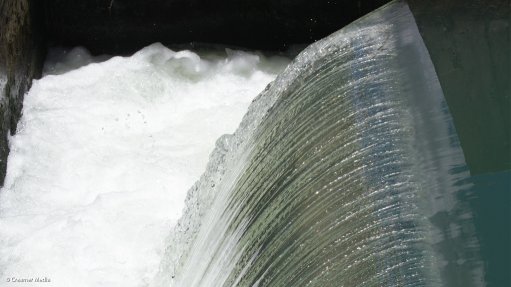
Photo by: Creamer Media
The Department of Water and Sanitation (DWS) has begun with the assessment of wastewater treatment plants in several municipalities across the country after the relaunch of the Blue and Green Drop Certification Programmes, which advocate for excellent drinking water and wastewater quality management.
The assessments under way are mainly for the Green Drop Certification Programme, which is aimed at ensuring that municipalities improve their maintenance and management of wastewater infrastructure. The Green Drop assessments conducted are for 963 wastewater systems in the country and will be finalised by February 2022.
“What we look for during these assessments are effluent and sludge quality compliance, the environmental, technical management, financial provision for operations and maintenance of the infrastructure, among other things,” says DWS acting chief director Siboniso Mkhaliphi.
Further, to assess the maintenance capacity of the wastewater systems, water services institutions (WSIs) are required to provide evidence of a maintenance team used for general maintenance work at the plant and pump stations and the provision of proof of competency of the team.
“The lifespan of the infrastructure partly depends on professionals who know what they are doing when carrying out operations and maintenance. The DWS has financially supported many WSIs in refurbishing wastewater treatment plants and, at times, the infrastructure funded by the DWS collapses owing to poor operations and maintenance,” Mkhaliphi points out.
Ineffective maintenance often results in sewer blockages, which have negative health effects for residents and the environment and these assessments are meant to protect taxpayers' money, he says.
The last Green Drop and Blue Drop reports were published in 2013 and 2014, respectively. The DWS is undertaking a full Green Drop audit and Blue Drop partial assessment in 2021.
In 2022, a full Blue Drop audit and a Green Drop partial assessment will be finalised.
A Green Drop Certification is awarded to wastewater systems that obtain scores of at least 90% when compared against the criteria set for wastewater management. This helps water services authorities improve management of wastewater, as part of the incentive-based regulation approach.
OBJECT FLUSHING
While the main source of pollution in communities typically come from wastewater treatment works (WWTWs) as a result of sewer blockages, poor operations and maintenance, as well as those operating above design capacity, the flushing of foreign objects, such as newspapers, disposable nappies and sanitary towels, also contributes to the malfunctioning of this infrastructure, he says.
“People are still flushing foreign objects, which may not block your drain in your household, but negatively impact on WWTWs and, when the infrastructure fails, these same communities complain. The DWS encourages municipalities to strengthen and enforce by-laws,” he says.
“We call on residents to play their part and stop flushing objects that should not be flushed down the drains. WWTWs are built to handle human waste and we all have a responsibility to ensure our WWTWs perform optimally, which can be achieved if we do what is right,” Mkhaliphi says.
The department uses its regulatory and support arms to identify challenges and address them as early as practically possible, ideally before any emergency situation. The role of the Blue and Green Drop programmes are key in this process.
“The DWS will not hesitate to take steps against municipalities to ensure environmental crimes are accounted for,” he says.